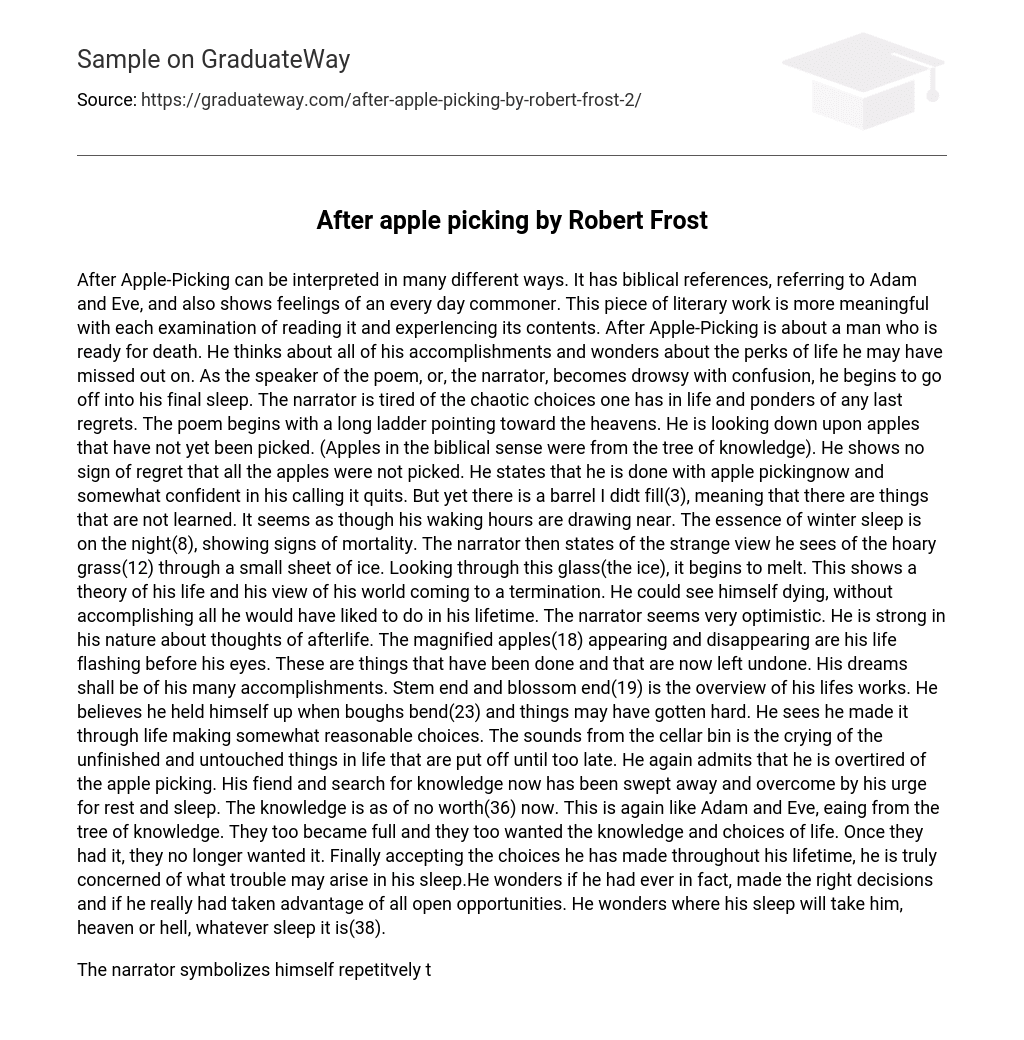After Apple-Picking can be understood in various forms, incorporating biblical allusions to Adam and Eve while also capturing the emotions of an ordinary person. This literary masterpiece gains deeper significance with each reading and personal encounter with its profound content.
After Apple-Picking is centered around a man’s readiness for death, as he reflects on his achievements and contemplates the aspects of life he may have overlooked. The speaker, acting as the poem’s narrator, grows increasingly drowsy and lost in thoughts before succumbing to his final slumber. Frustrated by the abundance of uncertain options in life, the narrator reflects on any potential lingering regrets.
The poem opens with a lofty ladder reaching up towards the sky. From this vantage point, the speaker observes untouched apples that remain unpicked. (These apples symbolize the fruits of knowledge as depicted in biblical accounts). The speaker does not express any remorse for leaving some apples behind and declares he is finished with apple picking, feeling somewhat assured in his decision to quit. However, there remains an unfilled barrel, signifying that there are still things left unlearned. It appears that the speaker’s waking hours are approaching, suggesting mortality looms near during the wintry sleep of night.
The narrator describes an unusual sight of the gray grass(12) seen through a thin layer of ice. As the ice gradually melts, it symbolizes the end of his life and his perspective on the world. He contemplates his mortality, feeling as though he won’t have enough time to accomplish all he desires. Despite this realization, the narrator remains hopeful and holds strong beliefs about the afterlife. The fleeting presence of enlarged apples(18) represents his life quickly flashing by before his eyes.
These are the actions that have been completed and those that remain unfinished. He will dream about his numerous achievements. “Stem end and blossom end” (19) provides an overview of his life’s accomplishments. He believes that he stood strong when faced with difficulties. He realizes that he successfully made it through life by making somewhat rational decisions.
The sounds from the cellar bin represent the lamentation of neglected and postponed aspects of life. The speaker acknowledges once more their exhaustion from apple picking. Their desire for knowledge and exploration has been overshadowed by a longing for rest and slumber. The value of knowledge is now insignificant. This situation parallels Adam and Eve’s experience of consuming knowledge from the forbidden tree, where they also became satiated and desired the vast array of choices life has to offer.
Once they possessed it, they no longer desired it. Eventually embracing the decisions made throughout their existence, they genuinely worry about the potential troubles that may arise during their slumber. They question whether they ever truly made the correct choices and utilized all available opportunities. Their concern lies in the unknown destination of their sleep, be it heaven or hell, regardless of the type of slumber it may be (38).
The narrator repeatedly symbolizes himself as the woodchuck in the poem. It implies that the speaker is alternating between a state of wakefulness and sleep, similar to hibernation. The speaker has consumed a significant amount of food, as mentioned in the line “Of the great harvest I myself desired.” (29), resembling the behavior of hibernating animals. Perhaps the reader, like an animal, awakens periodically to witness and encounter various experiences. Additionally, the approaching winter season feels reminiscent of mortality.
The speaker in this poem, a simple elderly man, discusses the question of what kind of sleep to expect. This may suggest a new life, an afterlife, or perhaps just the same sleep as a woodchuck. He speaks in a narrative form and is emotionally strained from the choices and confusions of life.
The narrator is reflecting on his interpretation of the theme of this poem. One aspect is the importance of not procrastinating. The man also seems to be very critical of himself for not taking responsibility for everything around him. He regrets missing out on opportunities and feels guilty for not continuously seeking knowledge. This suggests that one should never decline a lesson to be learned.
After Apple-Picking can also be interpreted as a reflection on one’s life experience. The syntax used in the poem is highly captivating and appears to be predestined. The short lines in the poem evoke a sense of unease. They are noticeably spaced out:
Line: The scent of apples: I am drowsing off
Line: I skimmed this morning from the drinking trough
This contributes to the ominous mood of the poem by causing a sense of disorientation, comparable to that of someone approaching death.
The death notes at the end of the lines signify the writer’s firm emphasis on the characters’ mortality. Additionally, the rhyme scheme is labeled using a basic ABCD pattern, extending all the way to the letter Y, before stopping abruptly at Z. This represents the stage of life that the narrator finds himself in. While not quite reaching the terminal stages of death, its presence looms near for him.
Bibliography
- Henderson, Gloria Mason, Bill Day, and Sandra Stevenson Waller.Literature and Ourselves. New York: Longman, 1996.
- Hacker, Diane.The Bedford Handbook.Boston: Bedford Books, 1998.
- Frost, Robert. After Apple-Picking





